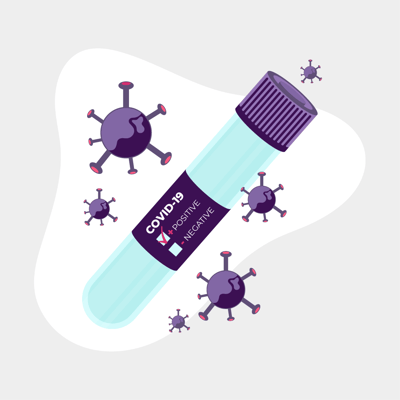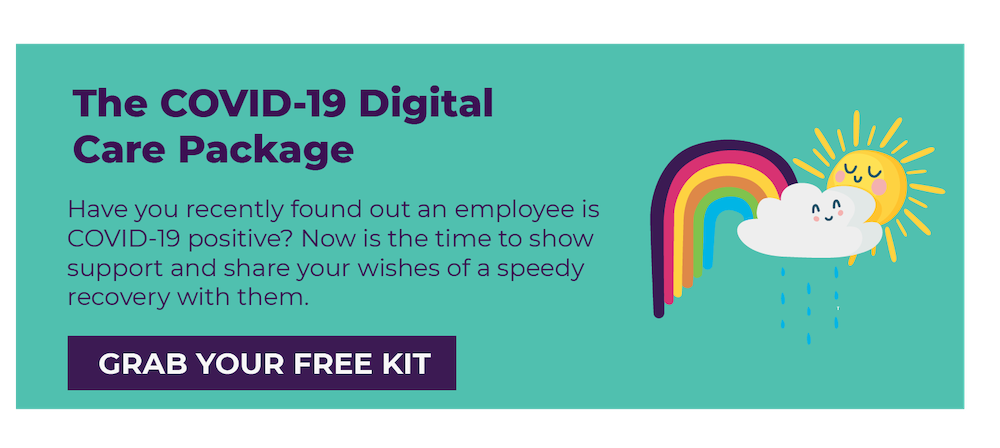 If you’ve recently gotten the dreaded news you’ve tested positive for COVID-19, it’s time to think ahead. You may be wondering, “Now what?”
If you’ve recently gotten the dreaded news you’ve tested positive for COVID-19, it’s time to think ahead. You may be wondering, “Now what?”
Here are the basics:
- Stay home
- Inform others
- Self-quarantine
- Self-monitor
- Sanitize surroundings often
- Return to work after recovery
First of all, if you’re in generally good health, take hope in the fact that you may find it’s a rather mild illness. WebMD reports early estimates of “overall COVID-19 recovery rate is between 97% and 99.75%.” But because it can be mild, it also can be deceiving in how contagious it really is.
The most important action to take is to stay home and rest.
On the other hand, if you have underlying health issues, it’s essential to stay in contact with your primary doctor and specialists. Doing so can expedite the necessary medical care to keep you healthy and strong.
Once you’ve gotten your COVID-19 test results back, you’ll want to do a few key things. Below, we cover why it’s a must to stay home, inform others, rest, and other get-well tips.
Here’s a look at what you need to do for yourself and others if you test positive for COVID-19:
Stay Home
This may be perhaps one of the most important aspects of dealing with a positive COVID-19 diagnosis. As soon as you know your COVID-19 status, stay home. Call your employer, cancel any appointments, and plan to stay in for the next two weeks.
When can you be around other people?
The CDC states you can be around others after:
- 10 days since symptoms first emerged and
- 24 hours without fever without the use of fever-reducing medicines and
- Other symptoms of COVID-19 are improving
Luckily, most people can recover safely at home. Staying home protects others from potentially being infected without you knowing you’ve infected them. It further reduces community spread and how it can impact others.
Inform Others
According to the Centers for Disease Control and Prevention (CDC), “An infected person can spread COVID-19 starting 48 hours (or 2 days) before the person has any symptoms or tests positive. By letting your close contacts know they may have been exposed to COVID-19, you are helping to protect everyone.”
One of the most compassionate and honest actions you can do after testing positive for COVID-19 is to inform those individuals you’ve been around most recently. Because the virus spreads so easily, it’s quick to transfer from household to household. This could impact not only others’ health but their financial situations, social interactions, and other personal issues that you aren’t aware of.
As soon as you have your results, notify anyone you’ve been around, including:
- Your employer
- Your child’s school
- Friends and family
Once you have a positive test, letting those individuals know (especially if you were not showing symptoms when you were around them) can help them be on the lookout for signs of illness. It also reduces the ability for it to spread further in the community.
Self-Quarantine
Once you’ve tested positive, it’s important to self-quarantine. This means not leaving your household for anything other than essential medical care. Groceries and other items you may need can all be easily delivered to your home now. Some even offer two-hour delivery for essentials.
If you live with others, this means practicing social distancing. Yes, even in your own household. If at all possible, consider quarantining yourself in a separate room with a door. Wear a mask when not in your room, bleach and sanitize common areas regularly (especially the bathroom), and minimize time spent in other areas of the home.
Other tips for self-quarantine:
- Wear a mask inside - If you live with others, it’s recommended that you wear a mask inside your home. Wash your mask often in hot water to kill bacteria.
- Take care of your mental health - Turn off the news. Don’t look at the daily COVID-19 death toll. It will cause anxiety and not help your immune system at all.
- Get rest and stay hydrated - Take naps, binge your favorite shows, and just relax. Keep a bottle of water with you at all times and sip on it throughout the day.
- Boost your immunity in any way possible - Your immune system needs the biggest boost it can get right now. Eat fruits high in water content and rich in vitamins. Take a multivitamin, along with vitamin D if your multi doesn’t have it. Consider zinc, elderberry, echinacea, and other immune-enhancing supplements.
- Take over-the-counter medicines - If you have a headache or muscle aches, consider trying an over-the-counter medicine like acetaminophen to help you feel better.
Self-Monitor
One of the most important actions to take while ill with COVID-19 is to monitor your symptoms. Everyone is different, and illness symptoms vary from mild to serious. Symptoms include fever, loss of taste and smell, cough, shortness of breath, headache, etc.
A simple way to do this is to keep a note on your phone or a piece of paper, starting from the day you noticed your first symptoms. Date each note and describe symptoms (as well as if they’ve gotten better or worse) along with any new ones you’re experiencing.
Want a symptom tracker? Check out this one from Nebraska Medicine.
You’ll also want to look for emergency warning signs for COVID-19. If you or a loved one is showing any of these signs, seek emergency medical care immediately:
- New confusion
- Bluish lips or face
- Trouble breathing
- Inability to wake or stay awake
- Persistent pain or pressure in the chest
Disclaimer Note: These aren’t all the possible signs to be on the lookout for when it comes to serious COVID-19 symptoms. If in doubt, call your physician ASAP.
Final Tips to Consider When Ill With COVID-19
Whether you’re sick with a cold, flu, or COVID-19, it’s essential to stay home when you get ill during the current pandemic. This keeps you safe (from wearing yourself down) and others from getting the virus.
Because it can be hard to differentiate between all three, you will likely want to be tested ASAP if you haven’t already been — especially if you’ve exposed others to the illness. Remember that before your first symptoms appear, you could have had the active virus two days prior, which means you may have exposed others.
A few final tips for what to do after testing positive:
- Wash your hands often - It bears repeating. Run your hands under warm water and suds up for at least 30 seconds. Don’t forget in-between your fingers, on top of your hands, and your wrists.
- Sneeze into your elbow - Avoid letting your germs fly free by sneezing into a tissue or your elbow if a tissue is unavailable.
- Clean everything - Sanitize high-touch areas like doorknobs, kitchen appliance handles, sink handles, countertops, tabletops, and the like.
- Avoid sharing personal items - If you live with others, skip sharing the same utensils, dishes, cups, dishes, bedding, and towels.
- Call ahead about appointments - If you have scheduled in-person health appointments that fall into your quarantine window, see if a telehealth/virtual visit option is available. It’s important to maintain your health in other ways, too.
- Let emergency technicians know your COVID status - In the unfortunate event that you need to deal with an emergency and call 911, let the medics know your positive COVID-19 status upon arrival. This will ensure they have the appropriate gear to keep them and other patients they interact with safe.
Last but not least, if you think you may have been exposed to COVID-19 or are showing symptoms, it’s best to get tested. Not only will this put your mind at ease, but it will also help you get the appropriate care needed. If you’re starting to have difficulty breathing, call 911 immediately. Don’t hesitate. As long as you inform the healthcare workers you may be dealing with COVID-19, they can take the proper precautions to help you.
If you’re dealing with the virus yourself or have a close loved one who is, focus on getting healthy above all else. Follow the doctor’s orders, self-quarantine, and rest.
From all of us here at TotalWellness, we sincerely wish you a speedy recovery!
Have you experienced COVID-19? What was it like for you and your family? What advice would you add to the tips above? Feel free to share your thoughts in the comments below.



